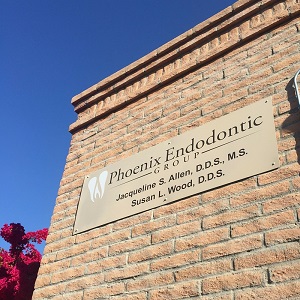
by Dr. Jacqueline S. Allen | Apr 27, 2016 | Blog, Endodontics, Root Canal
 When faced with the decision of saving a natural tooth through endodontic treatment, a patient should feel confident that this is the best choice for their health and cosmetic results. There are many advantages to saving the natural tooth such as: normal biting forces, efficient chewing, maintaining a natural appearance and limiting the need for more costly dental work. That coupled with the fact that dentistry has yet to produce a replacement for the natural tooth that looks, feels and FUNCTIONS as well as a natural tooth.
When faced with the decision of saving a natural tooth through endodontic treatment, a patient should feel confident that this is the best choice for their health and cosmetic results. There are many advantages to saving the natural tooth such as: normal biting forces, efficient chewing, maintaining a natural appearance and limiting the need for more costly dental work. That coupled with the fact that dentistry has yet to produce a replacement for the natural tooth that looks, feels and FUNCTIONS as well as a natural tooth.
A patient should never choose to have an extraction just because they think it will be cheaper. When a natural tooth is extracted, it will typically need to be replaced with an implant or some other dental prosthesis in order to prevent future problems. The cost of the implant or prosthesis and the extraction, is quite often, more expensive than the endodontic procedure that could help save the tooth for years to come. Most dental plans also cover endodontic procedures.
A patient should never choose extraction because they think the root canal treatment will be painful. Better anesthesia and modern techniques make most root canal treatments almost painless. In a recent study, patients that have root canal treatment are six times more likely to describe it as “painless” than patients that have never had root canal treatment at all!
A patient should never choose extraction because they think it will be quicker. Endodontic treatments generally require one or two visits lasting usually less than an hour each. Of course, an extraction is only one visit, but there can be several additional visits necessary to replace the tooth and they are usually longer.

by Dr. Jacqueline S. Allen | Apr 21, 2016 | Blog, Root Canal
 While modern root canals are safe, effective procedures that usually eliminate tooth discomfort, if you’ve never had one, you may not know what to expect immediately after your procedure.
While modern root canals are safe, effective procedures that usually eliminate tooth discomfort, if you’ve never had one, you may not know what to expect immediately after your procedure.
Here is a list of things to look for and be aware of in the days, weeks and months after your root canal treatment.
The first few days
- Don’t eat anything until the local anesthetic wears off, to avoid biting your cheek or tongue.
- Take over-the-counter or prescription pain relief medication as directed by your endodontist to deal with any discomfort after the procedure.
- To reduce post-operative swelling, you may apply ice on the cheek on the side of the face that is impacted. Try applying the ice for 10 minutes on, then 20 minutes off.
- Eat a soft diet for the first two days after the root canal. Avoid chewing directly with the tooth that received the root canal until a crown or other permanent restoration is in place.
- Brush and floss the affected tooth as you normally would.
The next few weeks
- Any discomfort you feel from the procedure itself should abate within 3 or 4 days. If it doesn’t, contact your endodontist immediately.
- If the temporary filling placed in your root canal comes out, have it replaced immediately. It’s normal to have a thin layer of filling wear off, but if all of it has come out, re-infection is a real danger.
- Make an appointment within two weeks of the root canal to receive a permanent restoration. A permanent filling or crown must be placed to ensure that bacteria don’t leak into the canal.
6 months and beyond
- It’s important to visit your endodontist occasionally after your root canal. He or she can monitor the impacted tooth and ensure the healing is continuing to progress properly.
- Although 95 percent of root canals are a success, it’s possible for a tooth to need retreatment later. The treated tooth can be damaged by injury, or become infected, or suffer extensive tooth decay, and need a root canal retreatment years or even decades later.
“Root canals are an easily tolerated procedure that is the treatment of choice to save an injured or infected tooth,” says Dr. Jacqueline S. Allen of the Phoenix Endodontic Group. “Understanding what to watch for during the post-op period will increase its likelihood of success.”

by Dr. Jacqueline S. Allen | Apr 18, 2016 | Blog, Business, Endodontics, Endodontist, Phoenix Endodontic Group
 The entire team at Phoenix Endodontic Group has a keen awareness that we are here to provide gentle and individualized care to all patients entrusted to us by our referring doctors or that have sought us out on their own. There are many endodontic specialists in the Valley, and we realize that we must always “be at our best” relative to patient care.
The entire team at Phoenix Endodontic Group has a keen awareness that we are here to provide gentle and individualized care to all patients entrusted to us by our referring doctors or that have sought us out on their own. There are many endodontic specialists in the Valley, and we realize that we must always “be at our best” relative to patient care.
Understanding what patients are seeking when they come to our office helps us be able to define what sets us apart from other endodontic specialists.
- Patients want to be treated with the state of the art equipment – Phoenix Endodontic Group consistently makes investments in technology and training to be able to deliver the best in modern endodontic therapy to our patients.
- Patients want their endodontist to listen to their concerns and fully answer their questions relative to treatment options – Phoenix Endodontic Group is the only endodontic practice in the Phoenix/Paradise Valley area with all-female practitioners. Dr. Jacqueline Allen and I have many years of experience and training treating patients with endodontic pain. We take our time with consultations and develop a treatment plan with the patients best interests in mind.
- Patients need access to care when they are experiencing pain and discomfort. No one can predict when the need for a root canal will arise. Phoenix Endodontic Group has two conveniently located offices that are open Monday – Friday from 7:00am – 5:00pm on most days.
At Phoenix Endodontic Group we live by a simple rule – Treat our patients the way we wish to be treated when we receive care. Living by this rule has help to make us one of the top endodontic specialty offices in the Phoenix/Paradise Valley area.

by Dr. Jacqueline S. Allen | Apr 11, 2016 | Blog, Endodontics, Endodontist, Root Canal
 As a practitioner of general dentistry, it’s your goal to provide quality service to your patients, even in the most challenging clinical circumstances. Sometimes, that means referring a patient to be treated by a dental specialist.
As a practitioner of general dentistry, it’s your goal to provide quality service to your patients, even in the most challenging clinical circumstances. Sometimes, that means referring a patient to be treated by a dental specialist.
For cases in which a natural tooth is threatened by infection or injury, the Phoenix Endodontic Group should be at the top of your dental referral list. Patients needing root canals, apicoectomies, or related procedures will benefit from the clinical expertise of the dentists at Phoenix Endodontic Group.
- Endodontists have two to three additional years of specialized training beyond dental school, focusing specifically on the treatment of tooth root disorders.
- Endodontists have a higher daily volume of clinical experience with procedures such as root canals — some average as many as 25 root canals per week.
- Endodontists have access to cutting-edge tools and microsurgical techniques, making the process safe and effective for patients.
- Endodontists are specialists in pain management and complex cases, with significant experience in saving highly damaged or severely infected teeth.
You may especially want to consider making a referral if you have a case that involves:
- The inclination or rotation of a tooth
- l Tooth roots or canals that are curved
- l Radiographs of the tooth that indicate the presence of a pulp stone in the canals
- l A tooth with a post or a crown
“General practitioners are held to a specialist’s level of care, so it’s important to have a strong referral network when you encounter a complex or challenging case,” says Dr. Allen of the Phoenix Endodontic Group. “Our practice specializes in difficult-to-treat cases. You’ll look good for referring them, and your patient will feel good after the procedure.”

by Dr. Jacqueline S. Allen | Mar 21, 2016 | Blog, Dental Implants
 When a client visits an endodontist’s office with an infected or damaged tooth, most of the time, the practitioner is able to save the natural tooth. However, sometimes this isn’t possible, and then it is necessary to extract the tooth and replace it with a dental implant.
When a client visits an endodontist’s office with an infected or damaged tooth, most of the time, the practitioner is able to save the natural tooth. However, sometimes this isn’t possible, and then it is necessary to extract the tooth and replace it with a dental implant.
Implantology is the branch of dentistry that deals with the permanent implantation of artificial teeth in the jaw. Dental implants are provided using the following general process when it is determined that a natural tooth must be removed.
- After a careful diagnostic examination has been conducted, the natural tooth is extracted.
- The jawbone is then prepared for the dental implant surgery. Some clients do not have sufficient bone density in their jaw to ensure a successful implantation, so it must be augmented with bone grafts prior to the implant process.
- During the dental implant surgery itself, the oral surgeon makes a cut to open the gum and expose the bone. Holes are drilled into the bone where the dental implant metal post will be placed. Since the post will serve as the tooth root, it’s implanted deep into the bone.
- After the post is placed, a waiting period is necessary to allow osseointegration, or for the post to integrate itself into the jawbone to provide a firm foundation for the dental implant. Often, a temporary tooth is provided during the waiting period (which can last up to six months), or the surgeon can suture the gum over the area containing the post to let it heal.
- Once osseointegration has taken place, the oral surgeon will place the abutment and the crown. The crown is a fixed prosthesis, meaning it is permanently attached to the jaw and does not need to be removed the way dentures or removable bridges do.
The Phoenix Endodontic Group considers the study of implantology to be a natural progression of their work as endodontists. Dr. Jaqueline S. Allen takes advantage of CE and study workshops that are offered on Endodontics and Implants – and always provide treatment in the patients best interest.
“Dental implants are a safe, effective means for restoring full function to a client’s mouth when their natural tooth must be extracted,” says Dr. Allen.

 When faced with the decision of saving a natural tooth through endodontic treatment, a patient should feel confident that this is the best choice for their health and cosmetic results. There are many advantages to saving the natural tooth such as: normal biting forces, efficient chewing, maintaining a natural appearance and limiting the need for more costly dental work. That coupled with the fact that dentistry has yet to produce a replacement for the natural tooth that looks, feels and FUNCTIONS as well as a natural tooth.
When faced with the decision of saving a natural tooth through endodontic treatment, a patient should feel confident that this is the best choice for their health and cosmetic results. There are many advantages to saving the natural tooth such as: normal biting forces, efficient chewing, maintaining a natural appearance and limiting the need for more costly dental work. That coupled with the fact that dentistry has yet to produce a replacement for the natural tooth that looks, feels and FUNCTIONS as well as a natural tooth.

 While modern root canals are safe, effective procedures that usually eliminate tooth discomfort, if you’ve never had one, you may not know what to expect immediately after your procedure.
While modern root canals are safe, effective procedures that usually eliminate tooth discomfort, if you’ve never had one, you may not know what to expect immediately after your procedure.

 As a practitioner of general dentistry, it’s your goal to provide quality service to your patients, even in the most challenging clinical circumstances. Sometimes, that means referring a patient to be treated by a dental specialist.
As a practitioner of general dentistry, it’s your goal to provide quality service to your patients, even in the most challenging clinical circumstances. Sometimes, that means referring a patient to be treated by a dental specialist.
 When a client visits an endodontist’s office with an infected or damaged tooth, most of the time, the practitioner is able to save the natural tooth. However, sometimes this isn’t possible, and then it is necessary to extract the tooth and replace it with a dental implant.
When a client visits an endodontist’s office with an infected or damaged tooth, most of the time, the practitioner is able to save the natural tooth. However, sometimes this isn’t possible, and then it is necessary to extract the tooth and replace it with a dental implant.